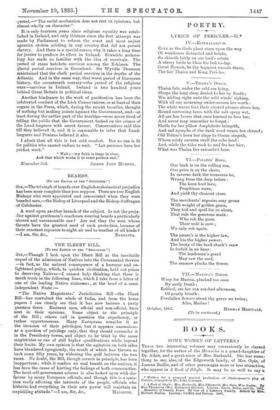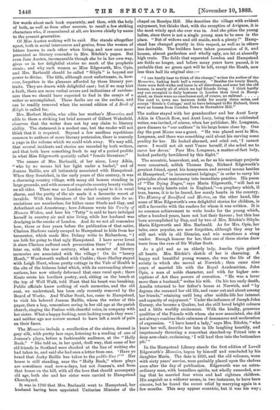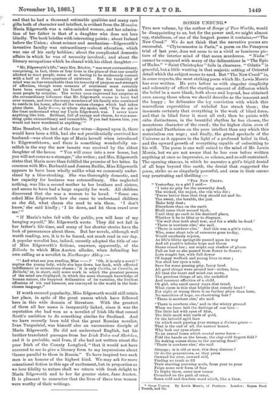BOOKS.
SOME WOMEN OF LETTERS.f
THESE two interesting volumes may conveniently be classed together, for the author of the Memories is a grand-daughter of Dr. Aikin, and a great-niece of Mrs. Barbauld. She has some. thing to say, also, of the Edgeworth family, of Mrs. Opie, of Joanna Baillie, and of other personages more or less attractive, who appear in A Book of Sibyls. It may be as well to say a • Written for a proposed musical production of Shakespeare's play of Pericles, arranged by Mr. John Coleman.
t A Book of Si6jL ; Mrs. Barbauid, Miss Edgeworth, Mrs. Opie, Miss Austen. fly Miss Thackeray (Mrs. Richmond Ritchie). London Smith, Elder, and Co. 1883. Memories of Seventy Years. By One of a Literary Family. Edited by Herbert Martin. London: Griffith and Ferran. I883.
few words about each book separately, and then, with the help of both, as well as from other sources, to recall a few striking characters who, if remembered at all, are known chiefly by name to the present generation. Of Miss Austen nothing will be said. She stands altogether apart, both in social intercourse and genius, from the women of letters known to each other when living, and now once more presented as literary comrades in Mrs. Ritchie's pages. But even Jane Austen, incomparable though she be in her own way, gives us in her delightful stories no mark of the prophetic strain ; and why such women as Miss Edgeworth, Mrs. Opie, and Mrs. Barbauld should be called " Sibyls " is beyond our power to divine. The title, although most unfortunate, is, how- ever, forgotten in the pleasure afforded by these literary por- traits. They are drawn with delightful ease ; but if we may hint a fault, there are more verbal errors and indications of careless- ness than we should have expected to find in the essays of a writer so accomplished. These faults are on the surface, and can be readily removed when the second edition of A Book of Sibyls is called for.
Mrs. Herbert Martin, who edits her mother's Memories, and adds to them a striking but brief account of Gilbert Wakefield, observes that the writer does not lay any claim to literary ability. The statement is a modest one, but the reader will not think that it is required. Beyond a few needless repetitions common to authors of more literary pretension, there is scarcely a page in the volume which we could wish away. We may add, that several incidents and stories are recorded by both writers, and that both have something fresh to say of a period prolific in what Miss Edgeworth quaintly called "female literature."
The names of Mrs. Barbauld, of her niece, Lucy Aikin, " who by no means hid her light under a bushel," and of Joanna Baillie, are all intimately associated with Hampstead. When they flourished, in the early years of this century, it was a charming country village, with many old houses standing in large grounds, and with scenes of exquisite country beauty visible on all sides. There was no London suburb equal to it in rural charm, and the purity of the air made it a favourite resort of invalids. With the literature of the last century also its as- sociations are numberless, for hither came Steele and Gay, and Arbuthnot and Armstrong ; here Johnson wrote his Vanity of Human Wishes, and here his "Tetty" is said to have indulged herself in country air and nice living, while her husband was drudging in the smoke of London. And do we not all remember how, three or four years before the publication of that satire, Clarissa Harlowe vainly escaped to Hampstead to hide from her tormentor, which made Mrs. Delany write to Richardson, "I am loth for going to that ugly Hampstead. I have never loved it since Clarissa suffered such persecution there " P And then later on, with the new century, what a number of literary memories are associated with the village ! On its "breezy Heath," Wordsworth walked with Crabbe ; there Shelley stayed with Leigh Hunt, whose pretty cottage in the Vale of Health is the site of the hideous hotel which, with its surrounding abomi- nations, has now utterly deformed that once rural spot ; there Keats wrote his loveliest poetry, and, sitting on the bench at the top of Well Walk, told Hunt that his heart was breaking. Public officials know nothing of such memories, and the old seat, we understand, has been only recently removed by the Board of Works. And Walter Scott, too, came to Hampstead, to visit his beloved Joanna Baillie, whom the writer of this paper, then a boy, remembers seeing in her old age at the parish church, singing the Psalms with cheerful voice, in company with her sister. What a happy-looking, neat-looking couple they were ! and neither age nor sorrow seemed to have left a mark of pain on their faces.
The Memories include a recollection of the sisters, dressed in grey silk, with pretty lace caps, listening to a reading of one of Joanna's plays, before a fashionable audience, at the "Holly Bush." " She told us, in her quiet, droll way, that some of her old friends in Scotland were shocked at the line of writing she had taken to, and said she had seen a letter from one. Have ye heard that Jocky Baillie has taken to the public line ?'" Her house is still standing, near the " Holly Bush," where plays are sometimes read now-a-days, but not Joanna's, and from that house on the hill, with all the love that should accompany old age, both she and her sister were carried to Hampstead Churchyard.
It was in 1786 that Mrs. Barbauld went to Hampstead, her husband having been appointed Unitarian Minister of the chapel on Roselyn Hill. She describes the village with evident. enjoyment, but thinks that, with the exception of Avignon, it is.
the most windy spot she ever was in. And she pities the young ladies, since there is not a single young man to be seen in the place. " Bat of widows and old maids, such a plenty !" Hamp- stead has changed greatly in this respect, as well as in others less desirable. The builders have taken possession of it, and houses, almost gardenless and wholly ugly, are let at absurdly high rents. The fields that separated London and Hampstead are fields no longer, and before many years have passed, it is probable that no green spot will be left, except the Heath, now less than half its original size :—
" I can hardly bear to think of the change," writes the author of the• Memories, looking back half a century. " Besides the lovely Heath,. there were field-walks and lanes in all directions, and none but the old. houses, in nearly all of which we had friends living. I think hardly any one occupied in daily business in London then lived in Hamp-
stead, as there were no omnibuses and, of course, no railroad The road to town ran between fields for nearly three miles, and except Steele's Cottage,' said to have belonged to Sir Richard, there were no houses from Camden Town to Downshire Hill."
The author stayed with her grandmother and her Aunt Lucy Aikin in Church Row, and Aunt Lucy, being then a celebrated writer, was invited, of course, when her publisher, Mr. Longman,. gave dinners to "our authors" in his large house close by. One day the poet Moore was a guest. •" He was placed next to Mrs. Longman, and there was something said about his carving some• poultry for her. He looked alarmed, and cried out, ' I cannot carve. I would not sit next Venus herself, if she asked me to carve her doves.' Poor Mrs. Longman, a matter-of-fact lady,, looked perfectly bewildered by this flight."
The eccentric, benevolent, and, so far as his marriage projects were concerned, selfish Thomas Day, Richard Edgeworth's- greatest friend, spent his honeymoon and several moons besides at Hampstead," in inconvenient lodgings," in order to carry his principles about matrimony into immediate practice. His poem of "The Dying Negro," says Maria Edgeworth, "will last as long as manly hearts exist in England,"—a prophecy which, it true, leaves, it is to be feared, few manly hearts in the country.
The History of Sandford and Merton, on the other hand, like- some of Miss Edgeworth's own delightful stories for children, is still a favourite with the readers for whom it was written. It is no common achievement to write books for the young which, after a hundred years, have not lost their flavour ; but this has been accomplished by Day, and by two of Mrs. Ritchie's Sibyls, Maria Edgeworth and Mrs. Barbanld. As for Mrs. Opie, her tales, once popular, are now forgotten, although they may be still met with in old libraries, and win sometimes a stray reader. Enough honour for her, that one of these stories drew tears from the eyes of Sir Walter Scott.
As a girl and as an elderly lady, Amelia Opie gained all hearts. Mrs. Ritchie's sketch of her is charming. A happy and beautiful young woman, she was the life of the society in which she moved at Norwich ; then came nine years of married life with the Royal Academician, John Opie, a man of noble character, and with far higher con- ceptions of Art than powers of execution. "He was a lover more than a husband," writes his wife. On his too early death, Amelia returned to her father's house at Norwich, and "by degrees she resumed her old life, and came out and about among her friends," retaining until long after middle-life her interest and capacity of enjoyment." Under the influence of Joseph John Gurney, she became a Quaker, but she still loved bright colours and a little worldly excitement. With the kindly, generous qualities of the Friends with whom she now associated, she did not always combine their calmness of demeanour and moderation of expression. "I have heard a lady," says Mrs. Ritchie, " who knew her well, describe her late in life laughing heartily, and impetuously thrusting a somewhat starched-up Friend into a deep arm-chair, exclaiming, I will hurl thee into the bottomless pit'" In the Hampstead Library stands the first edition of Lovell Edgeworth's Memoirs, begun by himself and concluded by his daughter Maria. The date is 1820, and the old volumes, worn with sixty years' service, were probably placed upon the shelves soon after the day of publication. Edgeworth was an extra- ordinary man, with boundless spirits, not wholly unneeded, see- ing that he married four wives and had eighteen children. His anguish as a widower seems, in two instances, to have been sincere, but he found the surest relief by marrying again in a few months. This may appear eccentric, but it was his way;: and that he had a thousand estimable qualities and many rare gifts both of character and intellect, is evident from the Memoirs. Maria Edgeworth was a calm-minded woman, and her admira- tion of her father is that of a daughter who does not love blindly. The book bristles with interesting points ; about Ireland before the Union ; about science and mechanism—Edgeworth's inventive faculty was extraordinary—about education, which was one of his early hobbies ; about the complicated domestic affairs in which he was of necessity involved ; and about the literary occupations which he shared with.his eldest daughter :—
"Mr. Edgeworth's life," says Mrs. Ritchie, " was most extraordinary, comprising, in fact, three or four lives in the place of that one usually allowed to most people, some of us having to be moderately content with a half or three-quarters of existence. But his versatility of mind was no leas remarkable than his tenacity of purpose and strength of affection, though some measure of sentiment must certainly have been wanting, and his fourth marriage must have taken most people by surprise. The writer once expressed her surprise at the extraordinary influence that Mr. Edgeworth seems to have had over women, and over the many members of his family who continued to reside in his home, after all the various changes which had taken place there. Lady 5—, to whom she spoke, said, You do not in the least understand what my Uncle Edgeworth was. I never knew anything like him. Brilliant, full of energy and charm, he was some- thing quite extraordinary and irresistible. If you had known him, you would not have wondered at anything.' "
Miss Beaufort, the last of the four wives—depend upon it, there would have been a fifth, had she not providentially survived her husband—was about the age of Maria herself when introduced t3 Edgeworthtown, and there is something wonderfully un- selfish in the way the new inmate was received by the eldest daughter of the house. "You will come into a new house, but you will not come as a stranger," she writes ; and Mrs. Edgeworth states that Maria more than fulfilled the promise of her letter. In common with Mrs. Barbauld and Joanna Baillie, Miss Edgeworth appears to have been wholly unlike what we commonly under- stand by a blue-stocking. She was thoroughly domestic, and her capacity for business was extraordinary. She neglected nothing, was like a second mother to her brothers and sisters, and seems to have had a large capacity for work. All children discovered that she was a woman to be loved. " Some one asked Miss Edgeworth how she came to understand children as she did, what charm she used to win them. I don't know,' she said kindly ; I lie down, and let them crawl over me.' " " If Maria's tales fail with the public, you will hear of my hanging myself," Mr. Edgeworth wrote. They did not fail in her father's life-time, and many of her shorter stories have the look of permanence about them. But her novels, although well worth reading, are, it is to be feared, not much read in our day.
A popular novelist has, indeed, recently adopted the title of one of Miss Edgeworth's fictions, unaware, apparently, of the Belinda to which Miss Austen alludes, when defending her own calling as a novelist in Northanger Abbey :-
"' And what are you reading, Miss — ?" Oh, it is only a novel !' replies the young lady, while she lays down her book, with affected indifference or momentary shame ; it is only Cecilia, or Camilla, or Belinda,' or, in short, only some work in which the greatest powers of the mind are displayed, in which the most thorough knowledge of human nature, the happiest delineation of its varieties, the liveliest effusions of wit and humour, are conveyed to the world in the best- chosen language."
If worth secured popularity, Miss Edgeworth would still retain her place, in spite of the great names which have followed hers in this wide domain of literature. With the greatest of them all her name is inseparably linked, since it was the reputation she had won as a novelist of Irish life that roused Scott's ambition to do something similar for Scotland. And we have recently been told that the great Russian novelist, Ivan Turgudnief, was himself also an unconscious disciple of Maria Edgeworth. He did not understand English, but his brother translated passages from her Irish Tales and Sketcltes, and it is probable, said Ivan, if she had not written about the poor Irish of the County Longford, " that it would not have occurred to me to give a literary form to my impressions about classes parallel to them in Russia." To have inspired two such men is an honour of the highest kind. We may ask for more sensational fiction in this age of excitement, but in proportion as we love fidelity to nature shall we return with fresh delight to Maria Edgeworth and to her far greater sister, Jane Austen. It is pleasant to remember that the lives of these true women were worthy of their writings.




































 Previous page
Previous page